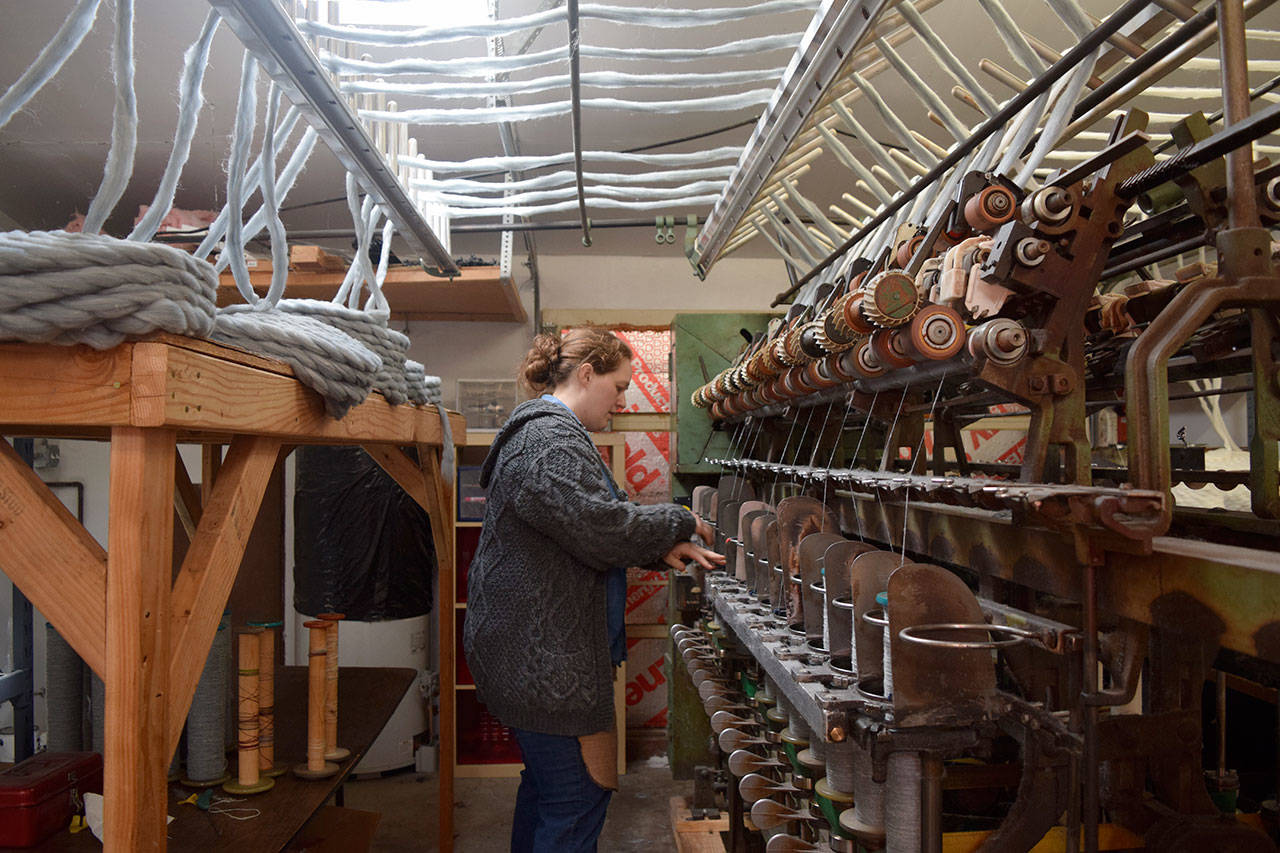Central Avenue in Clinton is home to what appears to be an average three bedroom house from the outside.
Yet inside, the hum of heavy machinery spinning, washing and carding textiles sounds throughout the small building as if it were a mid-century factory.
This is Abundant Earth Fiber; Whidbey Island’s own fiber mill.
“Most people in the community don’t know I’m here since the building looks like a little house,” owner Lydia Christiansen said. “But I’d like to show people on Whidbey Island that we have natural resources besides food that are right in front of us.”
Christiansen’s fiber mill seems like a blast from the past. Walking through the door, the front room looks like an average yarn shop with fine fabrics neatly hanging from walls and lying in bins, while a spin wheel and floor loom (a weaving machine) are also on display.
But behind the front office is where the magic happens. There are two large, open rooms stocked with a mix of industrial machinery: a carder that disentangles fibers, a pin drafter that ensures consistency in the fabric, and so on. If the machines are operating, there’s a sensory overload of the cogs at work processing textiles.
Though it resembles equipment from another era, Christiansen says most of the machines are in fact from the 1990s or later, but the pin drafter is from the 1950s. She bought the machines from an elderly couple in Oklahoma whom made textiles out of their garage.
“The machinery operates on turn-of-the-century technology,” Christiansen said. “The machines themselves are not old, but the methods are. But it’s good technology.”
Behind the open rooms and past the hallways lined with stacks of massive bags of colorful fibers, one can find raw wool hanging up to dry after Christiansen or her single part-time employee washes the fresh fabrics with a skirter. Lavender hangs from the walls and sits on tables to rid the building of moths. The tiny insects are like kryptonite for wool, but they detest the fragrant purple herb.
This is Christiansen’s happy place.
“Educating people on the process and the machinery is fascinating to me and a lot of other people who wouldn’t think so,” Christiansen said. “A lot of my customers are women, and it’s funny when they bring their moping husbands who actually end up captivated by the industrial machinery and the process.”
“I love sharing this, I love what I do and that’s why I do it despite the small profit margins.”
Abundant Earth Fiber sources its wool from Whidbey when possible, although that can be tricky considering not all sheep are raised to produce wool, rather dairy or meat. Christiansen has established relationships with shepherds and farmers, such as artisan sheep’s milk cheesemakers Glendale Shepherd and Coupeville’s Wild Rose Farm, and regularly sources her wool from those farms. Trying to keep things local, she also gets her wool from farmers she has met throughout Washington and Oregon, and sometimes elsewhere in the country. She doesn’t process foreign wool.
The fiber mill primarily sells its yarn online to personal weavers and businesses through its website. Christiansen says tapping into the online market is the best way to make money in the textile industry these days, but she does have regular customers in island businesses such as Casey’s Crafts in Bayview and Whidbey Isle Yarns, Gifts and Teas in Coupeville.
“Lydia starts out with good quality wool but she also knows how to handle it, so she ends up with really high-end products,” Laurie Davenport, owner of Casey’s Crafts said. “Her work is fabulous, reasonably priced and conveniently close. Plus, it’s convenient that the island has its own fiber mill.”
Christiansen says she has a devotion to source, process and the interconnectedness of all things. Localizing goods is vital for her, and she hopes to see products such as textiles head down a path similar to food, where people look to their local artisans and vendors for what they need. She believes Whidbey has nearly everything its residents need,, with valuable natural resources like foods and wool.
To reach a self-sustainable model, it just takes people to have a do-it-yourself attitude like Christiansen.
“The root of my local-ness is that the earth gives us the things we want and need,” Christiansen said. “My priority in using the word local in my business is to promote the idea that our natural resources have value.”



